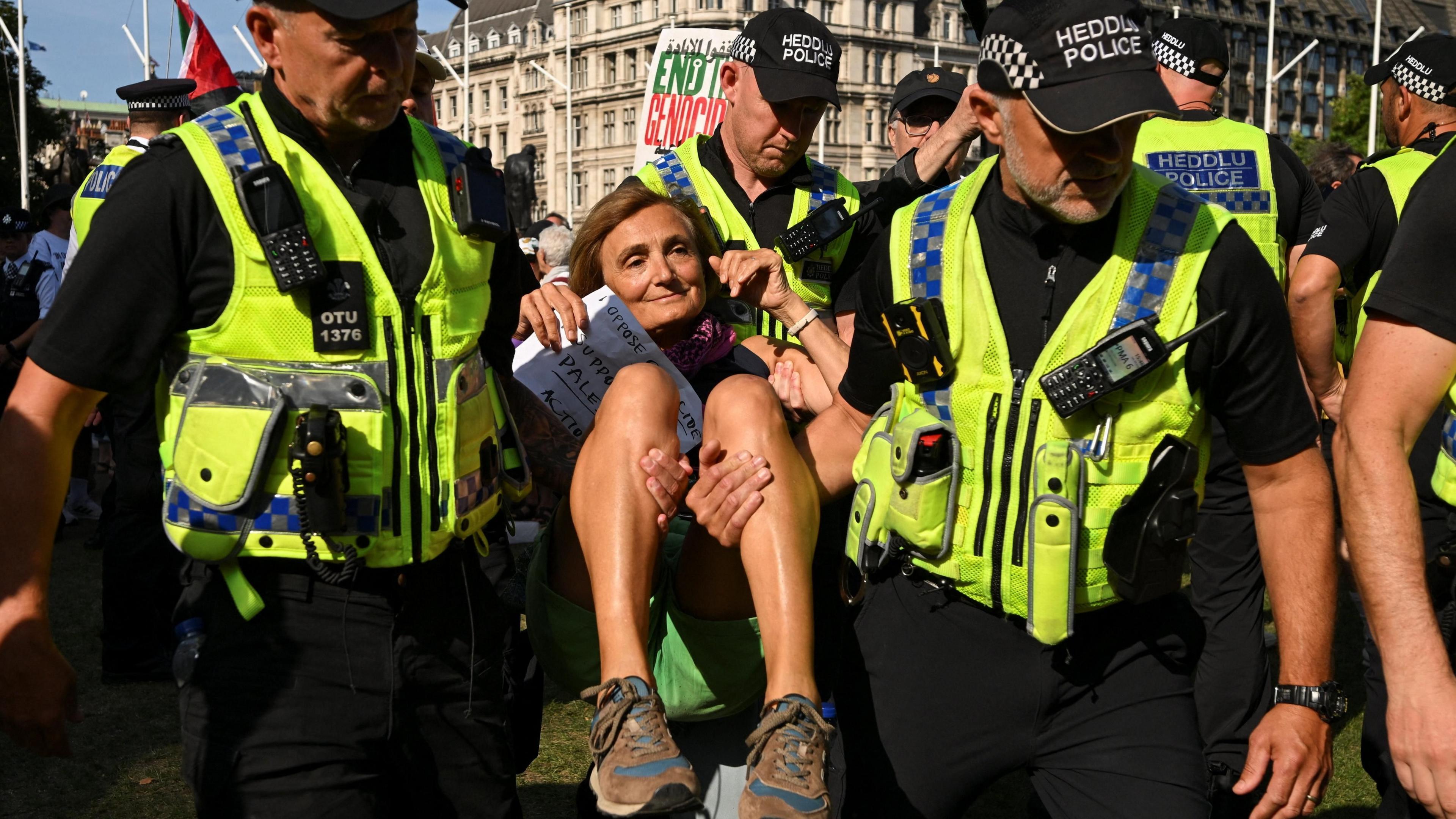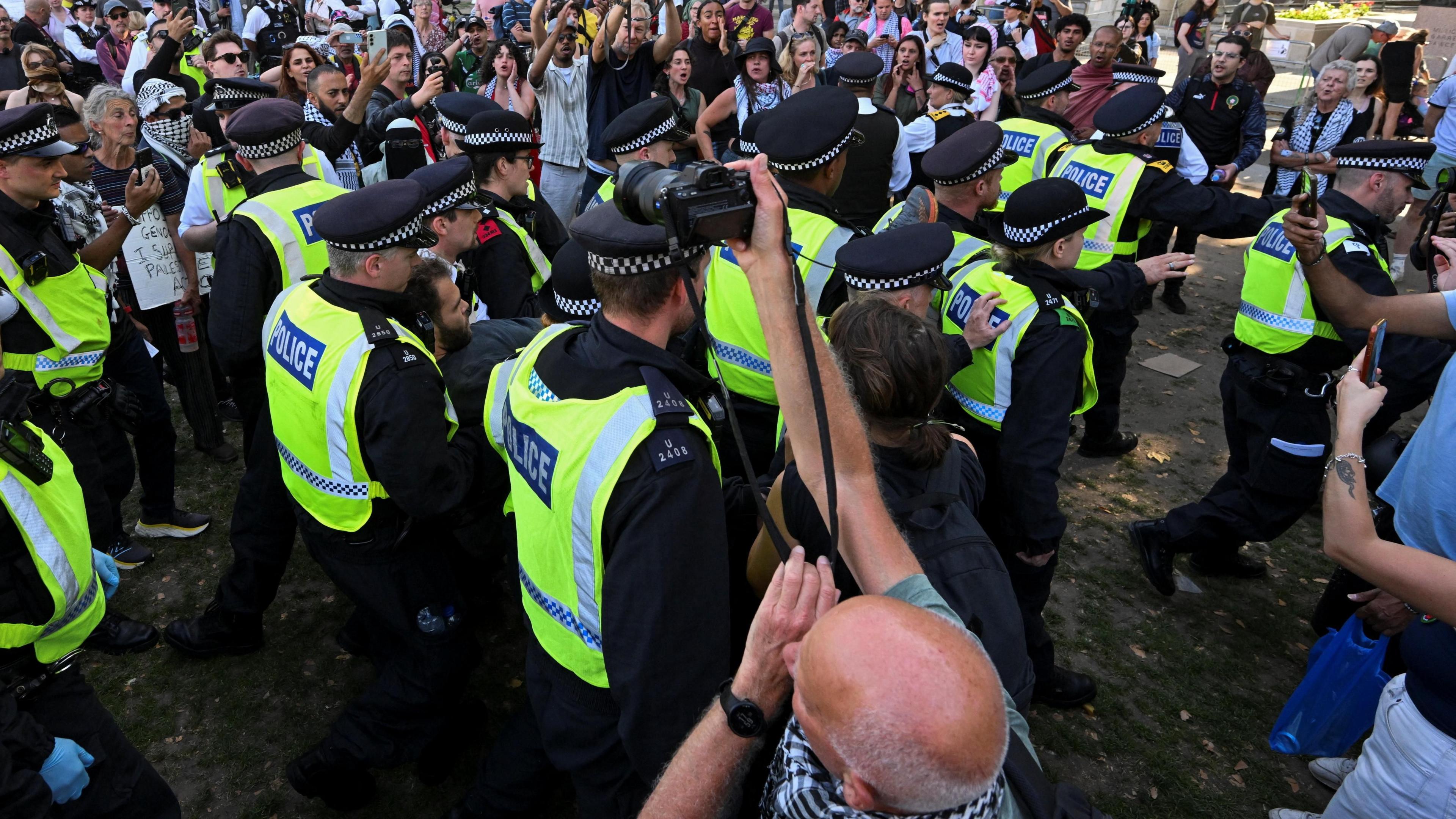Police to get broader powers to restrict repeated protests
Shabana Mahmood: "This is not about a ban, it's about restrictions and conditions"
- Published
Police forces will be granted powers to put conditions on repeat protests, the government has announced, a day after nearly 500 protesters were arrested.
Senior officers will be able to consider the "cumulative impact" of previous protests, the Home Office said, which could mean they instruct organisers to hold events elsewhere if a site has seen repeated demonstrations.
The Home Secretary told the BBC the move was not a ban on protests but "about restrictions and conditions".
Defend Our Juries - the organisers of Saturday's protests in support of proscribed group Palestine Action - said it will undertake a "major escalation" in response to Shabana Mahmood's announcement.
Mahmood told the BBC's Sunday with Laura Kuenssberg programme she accepted Jewish people who are angry with the government can be justified in doing so.
"I am very worried about the state of community relations in our country," Mahmood said as she outlined her a responsibility to think about the action the government can take to "strengthen our communities" and "to make sure people are well-integrated into our society".
"I do recognise the sense of people feeling let down," she added. "I do recognise that people have been saying for a while that this was only a matter of time.
"It is devastating to hear our citizens say that and I will ensure that the government response to what has happened meets the scale of the challenge that is being put to us."
Kemi Badenoch says the government 'must prove to Jewish people it has their back'
Conservative leader Kemi Badenoch backed the new powers but questioned why it had taken so long and said the government must prove it had the backs of Jewish people.
"We believe in free speech but that has to be within the bounds of the law, if protests are used to intimidate, to incite hatred then that is not protest," she told the BBC.
In a separate speech later on Sunday welcoming Conservative delegates to the Tory party conference in Manchester she said extremism in the UK "has gone unchecked".
Vowing that streets in the UK must not become a "theatre for intimidation", she said: "You see it manifest in the shameful behaviour on the streets of our cities, protests which are in fact carnivals of hatred directed at the Jewish homeland.
"We have tolerated this in our country for too long and we have tolerated the radical Islamist ideology that seeks to threaten not only Jews, but all of us of all faiths and none who want to live in peace.
"So, the message from this conference, from this party, from every decent and right-thinking person in this country must be that we will not stand for it anymore."
Police forces had warned resources would be stretched, with officers across the country offering additional support to hundreds of synagogues and Jewish community sites.
The new powers will be "brought forward as soon as possible", the Home Office said.
Currently, for police to ban a march entirely, there needs to be a risk of serious public disorder.
But under the new rules, where there have been repeated protests, police could impose conditions such as requiring it to be held elsewhere or on the duration of events.
Mahmood said that while the right to protest is fundamental "this freedom must be balanced with the freedom of their neighbours to live their lives without fear".
Large, repeated protests could leave sections of the country, particularly religious communities, "feeling unsafe, intimidated and scared to leave their homes", she added.
This had been particularly evident within the Jewish community recently, she said.
The home secretary will carry out a review of current protest legislation to "ensure powers are sufficient and being applied consistently", the government said.
This will include powers to ban protests outright, the government said.
Liberal Democrat home affairs spokesperson Max Wilkinson said the move would be the "worst of all worlds" by not tackling antisemitic hate but also undermine the "fundamental right to peaceful protest".
Most of those arrested at protests on Saturday were held on suspicion of supporting the proscribed group Palestine Action. All 493 people have been released on bail, the Met Police said in an update on Sunday.
Organisers Defend Our Juries said around 1,000 took part in demonstrations around Trafalgar Square against the ban on the group and opposing Israel's actions in Gaza.
Following the Home Office announcement on protests the group posted on social media accusing the government of "silencing opposition" and "authoritarianism".
Responding to Mahmood's comments, Defend Our Juries said: "It beggars belief that the government has responded to widespread condemnation of its unprecedented attack on the right to protest - from the United Nations, Amnesty International, legal experts and even the former director of public prosecutions - by announcing a further crackdown on free speech and assembly in our country."
Hundreds of people have been arrested since the group was outlawed by former home secretary Yvette Cooper in the summer, predominantly for holding signs saying they support Palestine Action.
Israel has repeatedly denied that its actions in Gaza amount to genocide and that its actions are justified as a means of self-defence following the 7 October 2023 Hamas attack.
But last month the world's leading association of genocide scholars said that Israel's conduct meets the legal definition as laid out in the UN convention on genocide.
The arrests have been criticised by human rights group Amnesty International, which said arresting people for "peacefully sitting down and holding these signs" was not a job for the police.
On Sunday the charity said the powers were "a reheat" of a move by the previous Conservative government that had been found unlawful by the courts.
Tom Southerden, its UK law and human rights director, said the move bore no relation to Saturday's protests which had been in a new location.
Watch: Activists applauded their fellow protesters as they were detained
Organisers of Saturday's protest, Defend Our Juries, had been asked to reconsider their plans following the killing of two men at the Heaton Park Hebrew Congregation synagogue on Yom Kippur - the holiest day in the Jewish religious calendar.
But organisers said in a statement beforehand it hoped police "choose to prioritise protecting the public from real terrorism, and not waste resources on enforcing the absurd and ridiculous ban on Palestine Action".
Former Tory MP and minister Dame Penny Mordaunt, who co-wrote a cross-party report on antisemitism, said there was "no doubt" some people at the rallies were "violent antisemites stirring up hatred", while Conservative Tees Valley mayor Ben Houchen said those standing alongside them were "useful idiots".
Labour MP Lucy Powell called for a "tougher regulatory regime" to stop the spread of antisemitism online, where she said the spread was phenomenal.
Adrian Daulby and Melvin Cravitz were killed after Jihad Al-Shamie drove a car into people and stabbed others outside a synagogue in Manchester. Al-Shamie then tried to force his way into the building before being shot dead by armed police.
Police later said that one of the men died after being struck by police gunfire. Three others were injured in the attack.
Several arrests have been made in relation to the attack and Mahmood said four people remained in custody on Sunday morning.
The home secretary will write to chief constables on Sunday to encourage them to use all their powers to prevent and respond to public disorder, as well as thanking them for their response following Thursday's attack.
Police forces are working with the Community Security Trust, a charity which works to protect Jewish people from terror and antisemitism, to reassure the Jewish community, the home office said.
On Sunday, the Board of Deputies of British Jews is holding a commemorative event ahead of Tuesday's second anniversary of the 7 October attacks on southern Israel, in which about 1,200 people were killed and 251 others were taken hostage.
The group has welcomed the government's move to increase police powers and described recent protests as "deeply irresponsible and offensive".
Clarification 20 October 2025: The reference to the synagogue attack has been expanded to explain that one victim died from police gunfire.
Related topics
- Published14 August

- Published12 August
